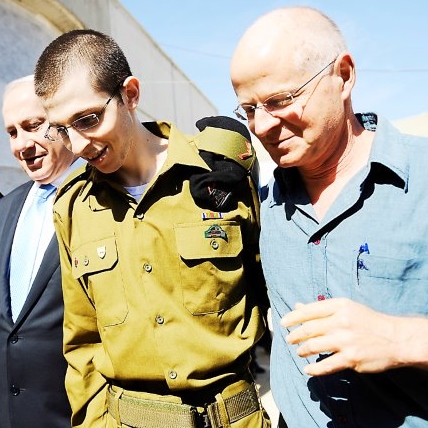
News

A moral, legal and human obligation to bring her soldiers home
PAULA SLIER
It was the morning of October 18, 2011 and after five-and-a-half torturous years, Gilad Shalit was being handed over by his Hamas captors to Egyptian mediators.
You could hear a pin drop. A few journalists raised their arms and some wiped their eyes. Disbelief turned to cheers as the impossible slowly became possible – the soldier who’d been 19 years old the last time he was seen alive, sat peering, pale and thin, through his rimless glasses into the world’s cameras.
Weeks earlier I had interviewed his father, Noam, who’d never lost hope he’d see his son again. “It’s the only thing that keeps me going,” he’d confessed.
That same belief helped another father, Herzl Shaul, stay strong – but the fight eventually killed him. Herzl’s son, 20-year-old Staff-Sgt Oron Shaul, died three years ago in the last Gaza war when he left his armoured personnel carrier to repair it after Hamas fired on his unit.
In the same war, 23-year-old Lt Hadar Goldin died after Hamas operatives exited from a tunnel located in the basement of a house in Gaza – it was two hours after a ceasefire had been declared.
Hadar’s body was dragged into an underground tunnel and despite pleas from both families and threats by the Israeli government, neither soldier’s remains have been handed over to Israel for burial.
“My Oron, my hero son, my mighty warrior, since you left, my body started to betray me,” Herzl wrote days before he was hospitalised for the final time. Stricken with cancer, his family released his last heartfelt letter to his son a week after he died.
Herzl wrote that he still had faith that one day his son would return home, wounded but alive. He confessed how proud he’d been when he’d joined a combat unit, but wrote: “I want to apologise to you my dear son that I didn’t listen to your mother” who had been against it.
This week Oron and Hadar are back in the news after the Israeli army blew up a Gaza tunnel, killing seven Palestinians inside. Five Hamas men subsequently died trying to save them. Jerusalem has their bodies and Prime Minister Benjamin Netanyahu says he will not return them unless there’s progress in negotiations to release Oron and Hadar’s remains – together with four Israeli citizens currently in Gaza.
The four willingly, and illegally, crossed over the border although it’s not clear if they’re all being held captive by Hamas.
Jerusalem has been accused of racism and of not doing enough to bring them back – three are Arab; one is of Ethiopian descent and three seem to be suffering from psychological disorders.
Hamas has refused outright. It accuses Netanyahu of blackmail and says it will only provide information in return for the release of Palestinian prisoners in Israeli jails. According to a report by Prisoners Support and Human Rights Association, there are more than 6 000 behind Israeli bars.
But Jerusalem is not keen on prisoner exchanges – especially after 1 027 Palestinian were released for Shalit in one of the biggest such deals. More than 200 of them have since been re-arrested by the security establishment for involvement in terrorism and seven Israelis have been directly or indirectly murdered by them.
I interviewed the sister-in-law of an Israeli policeman who’d been killed while sitting in his car. His killer was among those released for Shalit. She, like thousands of others, supported the deal, but feared the price. She cried the entire two hours we were together.
The family of Hadar Goldin, is criticising the Israeli government for not taking any real action to bring their son’s body home and have now filed a petition stopping the government from handing over the bodies of those Palestinians killed in the Gaza tunnel.
They’ve also called on the state to limit both visits to Hamas members in Israeli prisons, and humanitarian aid to Gaza, and say they intend going all the way to the High Court.
Netanyahu is on their side, but they’re up against the courts. Both Israeli and international law says everyone – including those deemed terrorists – have the right to be buried. But the law works both ways and the holding of bodies of soldiers killed in action and refusing their return so their next of kin can bury them, is a serious violation of the Geneva Conventions and international law.
In the letter to his son, Herzl wrote: “Since you were taken, hundreds of thousands of people who have never met you or know you, from the north to the south, all reached out and helped, showering us with genuine endless love. Simply because you were sent to war to protect them.”
Israel has a moral, human and legal obligation – despite the costs – to bring her soldiers home. Netanyahu knows this; Israelis know this; and Hamas too, knows this; which is why they’re not giving in easily. What’s not so readily known, is how to make it happen.
When Gilad Shalit was handed over, he was wearing a checked shirt. En route to Tel Nof air force base he changed into the IDF uniform he was wearing when he was captured. He exited the chopper onto the tarmac and saluted Netanyahu, his commander in chief.
“I brought your boy home,” the Prime Minister proudly told his parents as they – and the rest of Israel – breathed a sigh of respite. It seems only right that other parents be afforded the same relief.
Paula Slier is the Middle East Bureau Chief of RT, the founder and CEO of NewshoundMedia and the inaugural winner of the Europcar Woman in Leadership Award of the South African Absa Jewish Achievers.




